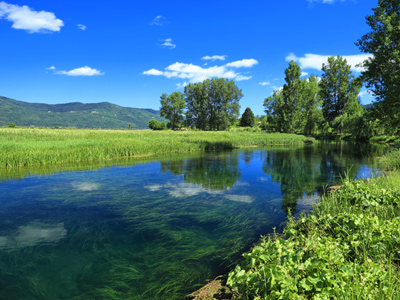
River Landscapes 01
Try this KS3 Geography quiz all about river landscapes. Rivers are the links in the water cycle that return water from the atmosphere to the seas. They begin in upland areas and flow downhill, affecting the landscape around them. In the upland areas, a river valley has a V-shape. The course of the river is affected by the rocks over which it flows. Outcrops of harder rocks in the form of spurs in the valley cause it to constantly change direction. The river is fast flowing and erodes the landscape, moving material from the uplands to the lowlands and all the way to the sea.
In some places, the courses of two rivers meet making a larger river. This is called a confluence and the two rivers are called tributaries. Some of the largest of the world's rivers have thousands of tributaries. In the lowlands, the flow is much slower and so the river meanders through the landcscape. On the outside of one of these meanders (bends) the flow of water is faster and the river bank is eroded. On the inside of a meander, where the flow is slower, deposition takes place.
Ready for more?
not all...
quizzers. Try to win a coveted spot on our Hall of Fame Page.







